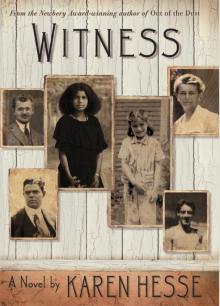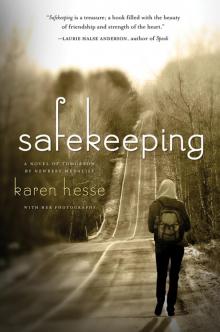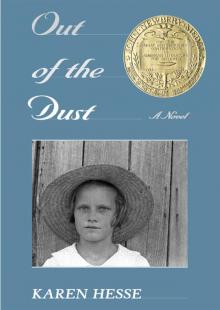- Home
- Karen Hesse
Safekeeping Page 3
Safekeeping Read online
Page 3
I should wait until dawn, until curfew ends. I should find a hiding place and sit out the rest of the night. But I can’t.
Not one vehicle passes me. I don’t know whether it’s because of the gas shortage or the curfew, but I’m grateful to know that something in this crazy new world is working for me.
I am less than five minutes from the house, from my parents, when I hear the growl of a car. Headlights are just coming around the corner. Another moment and they’ll see me.
I dive behind a fence on Putney Road. A dog begins barking. But the dog is quickly hushed. And the headlights sweep past.
Just when I am about to congratulate myself, I realize someone is watching from their upstairs window. I can see only the outline of a person, but I’m certain I’m being watched. I hold still, very still, and finally the curtain twitches and the person is gone.
Afraid to linger a moment longer, I slip out from behind the fence and quickly make my way to the Common.
Minutes later, I move silently up Channing Street, catching sight, at last, of home.
After all of these days of walking, I’m giddy with relief to see the silhouettes of those familiar chimneys in the gray dawn.
I step over a dark stain in the street as the eastern sky lightens.
At last I will be with my mother and father, protected by them. I’ll be clean again. Have regular food again. Soon everything will be back to normal.
The sight of the house thrills me. My father’s gardens appear as they always do this time of year, breathtakingly beautiful, with the crab apple blossoms fragrant in the dawn air. I stand in awe for a moment. The azaleas bloom beside the porch steps in wondrous profusion.
In the driveway, my mother’s car, my father’s truck, just as they should be.
“They’re here,” I whisper as I climb onto the porch. “They’re home.”
* * *
I don’t have my key so I lean on the bell. Dad would never be up this time of day but Mom will be.
When no one answers, I try the doorknob. It turns easily … this enormous door that always sticks in humid weather … it opens with the slightest push as if it’s been expecting me.
By the light from the approaching dawn I see my reflection in the big front hall mirror.
I take a moment for a general damage report, surprised that I don’t look worse considering how I feel. I want to look okay when they first see me. I want my parents to be proud, not horrified.
“Mom?” I call. “Dad?”
The house answers with an unnerving silence.
Sensing movement outside. I peer through the sheer curtains. Two policemen in uniform get out of their vehicle at the end of our front walk.
It’s dawn. Why are they here? It’s as if they’ve been waiting for me.
I throw the lock on the door and rush up the stairs, hoping, with each step, that I will catch sight of my mother, my father, that one of them will beckon me silently to safety.
But not even Romulus shows his face.
As I reach the attic, the part of the house exclusively Mom’s, I hear pounding at the front door. Looking for a place to vanish, I search all the angles, all the nooks of my mother’s workspace. None offer the concealment I need. And then I remember the crawl space under the eaves.
Because there is no knob or latch to pull it open, I use my fingernails to pry the door from the wall, fold myself in half and creep inside the airless space. I pull the door back into the wall and hunker down.
My father finished this little room years ago when he remodeled the attic for Mom. He said it gave him access to wires in the ceiling of the floor below.
Crouching, I wait, my nostrils filled with my own stench. I concentrate on my breathing, willing my chest to fill and empty. But I can do nothing to still the wave of panic flooding me as the police continue to pound on the front door two floors below. I wonder if the hammering of my heart is truly as loud as it is in my own ears.
Finally, the police give up. I wait in the airless space under the eaves. When I feel safe enough to emerge, I crawl across the wood floor and seek comfort under my mother’s desk. Cowering there, I wait for my parents to come out of hiding.
* * *
There’s not a sound in the house. Not the entire day. I’m afraid the police have left someone behind to watch so I wait until night has filled every corner of the attic. When the house is completely dark, when the street is utterly still, I begin a methodical search of every room, on every floor.
No sign of my parents anywhere. My mother’s camera and wallet are gone from the front hall. But my father’s CPAP, the thing he uses to help him breathe at night, is still at his bedside. There’s no sign of Romulus.
I look for a note, for a clue, as I search each room. I find nothing.
In the kitchen I open the refrigerator door, forgetting about the light coming on. But no light comes on. Instead, the foul odor of spoiled food smacks me squarely in the face. My stomach is empty but the stench still makes me gag.
Slamming the refrigerator door shut, I flee from the kitchen where the smell of rot now overwhelms the room. Climbing up to the second floor, I grab the flashlight from Dad’s nightstand and gather clothes from my closet, collecting bits of my life to carry back to the nest I am making for myself in the attic.
In my mother’s office everything remains as I remember it. The mess my mother apologizes to visitors about but never cleans up. The desk clock Dad made for Mom out of wood from our old butternut tree. The tiny music box I brought her from Paris. I stroke the satin pouch with my mother’s knitting needles, I run my fingers over her old cameras. I pounce on my mother’s address book. Phone numbers, at last. But when I pick up the phone on my mother’s desk, it’s dead.
Surrounded by familiar objects, I try to sleep, but I’m hungry.
Padding all the way back down to the kitchen I find the stench has mostly abated. Dad’s assorted bags of chips and pretzels fill a basket on the granite countertop. Grabbing the basket, I head back up to the attic.
Ever since I left Haiti I held only this one plan … to get home, to be with my parents. Finally I am where my parents should be. But they’re not here.
I keep turning over options, like a fisherman looking for worms under stones, but I find only empty holes.
* * *
I wake clutching Jethro’s bear, jolted from sleep by the sound of banging at the front door, two floors below. Angling myself to peer from the attic window, I grip the sill and gaze out.
The police have returned. I’m not sure why they’re looking for me. I don’t know why they start their day so obscenely early.
But I don’t intend to find out.
Even after they give up and go away, I am afraid to go outside in daylight.
Instead, I spend hours in the house, spying out the window, watching for a familiar face below, someone, anyone who might help. But there are few people passing, and none I recognize.
If only I could safely run out and knock on doors, find a sympathetic friend, someone who could tell me where my parents are. But it’s not safe to go out. Not with the police looking for me. Only after dark do I dare prowl the eerie streets. In this town, because of my parents, because of my mother’s celebrity, I am known by enough people to be recognized and turned over to the police.
All day I have thought about how few friends I have. If this had happened two years ago, I would have gone straight to Chloe. But Chloe is gone.
The only other person I’m close to is Janine. Under cover of night, like a missile, I lock in on her place, a few blocks from my house, making my way through a darkness unfamiliar in Brattleboro. Not a streetlight, not a house light shining.
I tell myself Janine will know what to do. She’s older, wiser. Maybe she’ll even know where my parents are. It will be so good to see her. And maybe her toilet flushes.
I can see dimly as I make my way through the inhospitable dark. Occasionally I’m aware of others moving around me in the night b
ut some sixth sense allows us to avoid each other.
Feeling my way blindly up the stairs to Janine’s apartment, I tap lightly at her door. No answer.
I’m afraid to knock harder, afraid of drawing the attention of the other tenants in the building. I try tapping again, then reach for the knob and twist, but the door is locked. It doesn’t budge.
I tap once more and wait. I’m met only with a dense silence. Maybe, when this all began, Janine moved back to her parents’ house. I wouldn’t blame her. But I can’t go to find her there. Her father had American People’s Party signs all over his front lawn. He held a fund-raiser for the APPs in his living room. I wouldn’t be safe there.
Climbing back down the steps, I use my hands to find my way. Finally, I stumble down the last flight, and when I’m confident I’m not being watched, I slip out of Janine’s building.
Afraid to push my luck any further, sliding along through the shadows, swallowing down my disappointment, I make my way back to my empty house.
* * *
My life settles into a surreal routine. At random times each day the police park outside the house, stride up the front path, climb the porch steps, and pound on the door. Each day I press against the attic wall, hidden from sight, my heart thudding, waiting for them to go away. They have not forced the door yet. I wonder how long until they do.
After they’ve gone I spend some time watching out the window, some time going through my things, my parents’ things.
I consume everything in the pantry, everything that can be eaten without cooking: canned tuna, canned peaches and pears, an entire jar of peanut butter. I even eat Romulus’s cat food.
* * *
Our street used to be so busy. People took Channing to bypass Main Street, admiring the small, well-kept gardens.
The gardens of Channing Street are no longer well-kept. Tall grass overshadows tangles of weeds. Faded blossoms lie on the ground, the life choked out of them.
Hardly anyone makes their way up Channing Street now. And those who do look straight ahead, minding their own business.
* * *
After waiting and watching through another long day, in the deep night I slip out of the house. It’s hunger that brings me out this time.
I’ve spent all day thinking about the location of Dumpsters in the neighborhood. The nearest one is behind the American Legion, only a block away. It’s on a side street, and there is only one house within sight of it. I should be able to get what I need and return home quickly.
But the Legion Dumpster is empty. I move to Plan B.
The next nearest Dumpster is just a few hundred yards from here, but that puts it within sight of the police station. Best to avoid that one, I think.
Instead, I decide to cautiously make my way over to the bin beside the Putney Road Market.
I am more exposed here, right on the main drag. The market sits across from the county courthouse. But there isn’t anyone going in or out of there at night, not like there is at the police station.
Still it feels as if I’m walking into the lion’s den. I approach the Dumpster slowly. There is no movement, no sound, no lights, no emergency generators growling.
I gather food quickly from the bin and check to make certain no one has seen me, no one has heard me, no one is near me as I sneak back toward the safety of the house.
With my backpack full, I avoid the path in front of the courthouse where there might be cameras. Instead I return home via the Common, the site, in better times, of concerts and rallies, weddings and fairs. Now the Common looks deserted, haunted.
The tall bronze statue stands silently in the three a.m. chill. It had been placed there at the conclusion of the Civil War, erected by a grateful town that swore it would never forget the horror of neighbor pitted against neighbor.
Now the statue, green with age, rages as only bronze can, in cold frustration.
I will myself safely home, unable to shake the feeling of being watched. This time of night is for the lawless, the curfew breakers. I have been lucky so far. But I remember that night in the woods between Manchester and Brattleboro, listening to fists against flesh, witnessing with my ears a suffering that could just as easily have been my own.
I’m at the far corner of the Common, almost home, when I’m jumped. I sense my attacker only a moment before he slams hard against me and begins pulling at my pack.
Surprise unleashes my fury. I spin and grab at my attacker’s hand as it scores my face. I bite down hard on thin fingers. Then kick, aiming first for the groin, then for the shins. I hear a snap, a cry of agony. I do not look back. The moment I feel my attacker let go, I pull away and tear home.
My hands tremble as I try to fit the key into the lock.
It takes several attempts.
Every few seconds I look back over my shoulder; no one is there. No one has followed me.
Back inside the house, I lock the door and bang up to the attic where I curl under my mother’s desk and wait for my heart to stop pounding.
Throughout my childhood I played at being a superhero. My mother would photograph me, image after image, a mildly bemused expression on her face. What would her face reveal now, I wonder, to know the true savagery of her daughter?
Later, much later, I unpack my evening’s take. Slowly I chew on sandwich crusts, on expired chips, on bruised and rotting apples.
* * *
The police have returned four times in as many hours. They are determined to take me. I’m determined to frustrate them.
There is no point remaining here. Not without my parents. Not like this.
I need a place of safety. If I stay in this house much longer I’ll be taken for sure, transported to jail for no reason, like the dreadlocked man from the plane.
Monsieur Bellamy urged me to head north to Canada if things got too dangerous in the U.S. It seemed ridiculous at the time, but now waiting out this madness from the safety of Canada makes sense to me.
I write a note for my parents in case they return home before I do, and hide it in their bedroom.
Pawing through the maps in my father’s office, I find one of Vermont that’s only a few years old. I know we have a newer one. Maybe my parents have taken it and gone off on foot ahead of me. Why shouldn’t they? If the police were after them, too … if they thought I was safe in Haiti … why shouldn’t they have gone?
I check every drawer in my mother’s office, in my father’s office, in their bedroom, and in my own. I manage to gather fifty-seven dollars in stashed money. It feels as if I’ve struck gold.
In my backpack goes the Vermont map, a thermos, a spoon and fork, a flashlight, spare batteries, a pocket knife, three books of matches, a first aid kit, a length of rope, a roll of duct tape, an old blanket, a change of clothes, and Jethro’s bear. At the last moment I grab two handfuls of my mother’s loose photographs and zip them into my pack too. Something to look at while I’m on the road, something to keep me from missing “home” too much.
Everything else I can live without.
* * *
Dressing in drab colors makes me nearly invisible. I plan on following Route 5 all the way north, along the eastern edge of the state. Route 5 should take me up to Newport, where, with any luck, I’ll slip across the Canadian border as easily as I slipped into Vermont … quietly, unnoticed.
Once I’m safely away from the U.S. I’ll figure out what comes next. No point in planning too far in advance.
In the last moments before leaving the house, I gather some of my most precious things and stow them in the crawl space in the attic for safekeeping.
I don’t know what drives me to hide these things but I feel better after it’s done.
* * *
Escaping into the night, I hesitate for a moment in my father’s garden. A shape emerges from the house across the street.
I freeze. The person across the street freezes, too.
When I start again, I take long, soundless strides, resisting the urge to lo
ok behind me, prepared to fight if there’s another attack.
At the corner I steal a quick glance over my shoulder. The person has stopped mid-block. He stands watching me. I don’t fear him, there is no aggression in his posture. But I don’t like that I’ve been seen.
I cross an empty Route 30, then hurry along the Common.
At last I turn north on Route 5.
When I look again, there is no one behind me.
Silently I say good-bye to my parents.
I tell them, I can take care of myself. I can do this.
But I don’t know if I’ve ever been as homesick as I am at this moment, walking north in the dead of night, away from Brattleboro, away from home.
part two
Occasionally, a small group of people glides through an empty parking lot as I make my way out of town. We avoid each other.
I move quietly, on full alert.
It seems I have chosen a good night to leave. The moon is waxing full and makes it easier to see in the dark despite a thin cloud cover.
Those of us defying the curfew are so vulnerable. This part of Route 5 is just one long strip of commercial development, one parking lot after another. It’s astounding that not a single car comes past.
Caution slows me. I am as wary as a cat. I imagine threats behind me and frequently spin to catch a would-be assailant only to find an empty road at my back.
* * *
The shops eventually give way to woods. The moon has gone behind a dense mat of clouds. It’s impossible to have anything but a dim sense of where to put my feet. But I feel safer than I did walking through the parking lots. And each step north takes me farther from the law knocking at my door.
The night is long, punctuated by the occasional barking of dogs. But no one opens a door to look out. It is almost as if they’re afraid to check what has startled their pets.
I remember a few years ago hearing about a pack of dogs that hunted at night just for the pleasure of the kill. They weren’t hungry. They were well-cared-for pets. But they’d gotten a taste for blood, for the chase, slaughtering small livestock within an ever-broadening circle of their homes. People were afraid the pack would turn on children next.

 Witness
Witness Safekeeping
Safekeeping Sable
Sable Out of the Dust
Out of the Dust Letters From Rifka
Letters From Rifka The Music of Dolphins
The Music of Dolphins Wish on a Unicorn
Wish on a Unicorn A Light in the Storm
A Light in the Storm